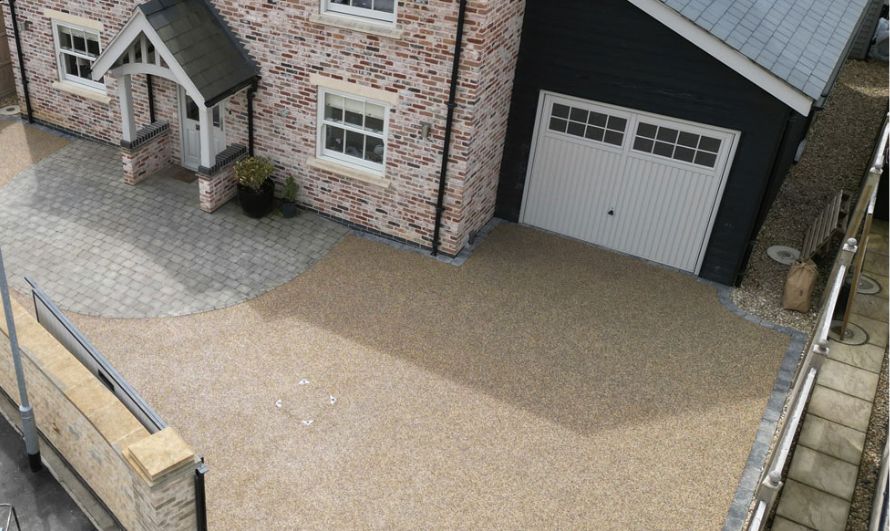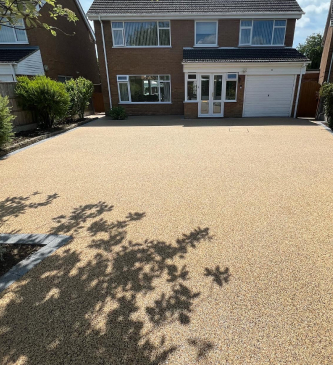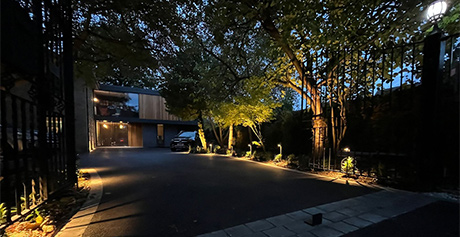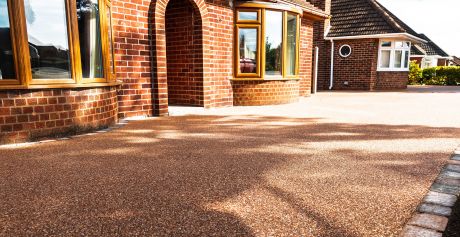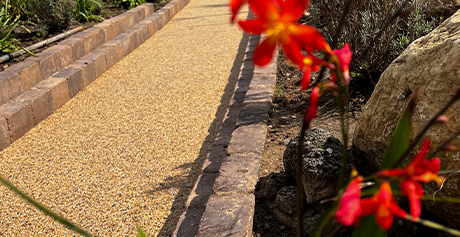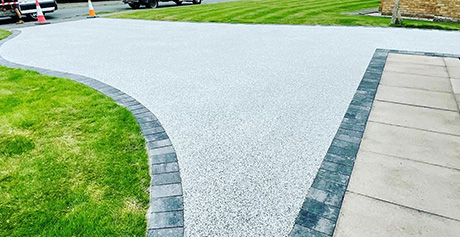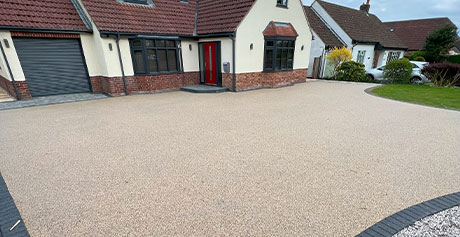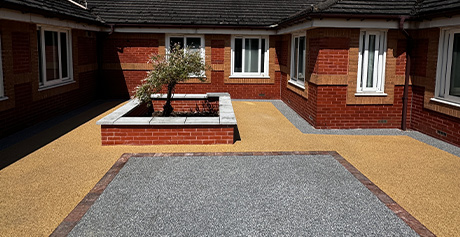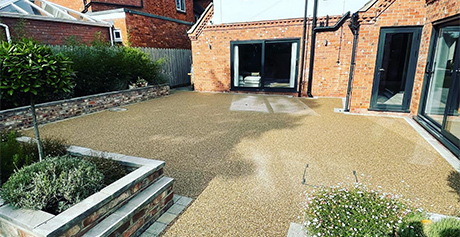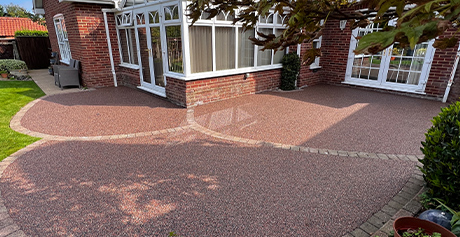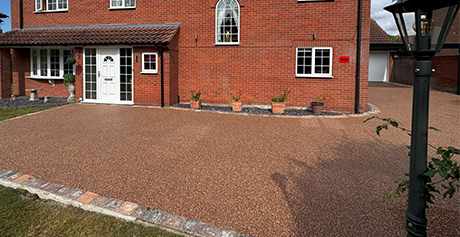Frost Resistant Resin Driveways
As autumn fades and winter draws near, frost becomes part of daily life across the UK. Mornings sparkle with ice, paths can get slippery, and outdoor surfaces face freezing temperatures that can cause cracking or damage.
If you already have a resin bound driveway or patio, you’ll be glad to know it’s designed to handle exactly these conditions. And if you’re thinking about upgrading, frost resistance is one of the best reasons to make the switch before the coldest weather arrives.
This blog explains how resin bound surfacing copes with frost, why it outperforms traditional materials, and what simple steps you can take to keep it looking its best through the winter months.
Why Frost Can Damage Traditional Driveways
When temperatures fall below freezing, water trapped in tiny cracks or gaps expands as it turns to ice. Over time, this cycle of freezing and thawing causes small cracks to grow, eventually leading to potholes or broken edges.
Driveway materials such as concrete, tarmac, and block paving are particularly vulnerable because:
- Water can’t drain through them, so it pools on top or seeps into joints.
- Temperature changes cause expansion and contraction, leading to surface stress.
- Weeds and moss grow in cracks, making damage worse over time.
In short, even well-laid traditional surfaces tend to need repair or resurfacing after a few harsh winters.
How Resin Bound Surfacing Handles Frost
Resin bound surfacing works differently. It’s made by mixing natural stone aggregate with a specialist resin, creating a smooth, solid surface with tiny gaps between the stones. These micro-gaps make it fully permeable, which means rainwater drains straight through rather than sitting on top.
When temperatures drop, there’s very little water left to freeze on the surface. This stops frost damage before it starts.
The benefits include:
- No puddles, no ice build-up – safer for walking and driving.
- No cracks caused by expanding ice – because water can’t get trapped.
- Less maintenance – no need for regular patching or sealing.
To learn more about the overall resilience of resin bound driveways, take a look at our earlier blog The Durability of Resin Bound Driveways: What You Need to Know.
The Science Behind Freeze-Thaw Resistance
Resin bound surfaces are built to cope with the natural freeze-thaw cycle that damages other materials. The flexible resin moves slightly with temperature changes, absorbing the stress that would normally cause cracking.
Because the surface is continuous and seamless, there are no joints for water to penetrate. Combined with the permeability of the stone mix, it creates a strong, weather-resistant layer that stands up beautifully to British winters.
Maintenance Tips for Frosty Weather
Even though resin bound driveways are extremely durable, a few simple maintenance steps will keep them in top condition all winter:
- Sweep regularly – remove leaves and debris so they don’t trap moisture.
- Use rock salt sparingly – it won’t harm the resin, but you don’t need much to prevent ice.
- Avoid metal shovels – use a plastic one to protect the surface if snow settles.
- Wash away residue – once the frost passes, rinse away any leftover grit or salt.
If you’d like a refresher on caring for your surface throughout the year, our blog What Makes Resin Bound Surfacing Low-Maintenance and Long-Lasting? explains everything you need to know.
Safety Benefits in Winter
When frost hits, safety becomes a concern around the home. Resin bound surfacing helps reduce the risk of slips and falls because of its naturally textured, non-slip finish.
This makes it ideal for:
- Driveways on a slope.
- Paths used by older relatives or young children.
- Wheelchair-friendly access routes.
You can also combine your resin surface with subtle outdoor lighting to make paths and driveways safer after dark. For inspiration, see our blog Night and Day Transformation: The Power of Driveway Lighting.
How Resin Bound Compares with Other Winter Surfaces
| Surface Type | Frost Resistance | Maintenance Level | Permeability | Overall Lifespan |
|---|---|---|---|---|
| Resin Bound | Excellent | Very Low | Fully Permeable | 20+ Years |
| Tarmac | Moderate - prone to cracks | Moderate | Non-permeable | 10-15 Years |
| Block Paving | Poor - joints trap water | High | Semi-permeable | 10-15 Years |
| Concrete | Poor - brittle under frost | Moderate | Non-permeable | 10-12 Years |
As the table shows, resin bound surfacing not only handles frost better but also saves time and money on maintenance over the long term.
Conclusion
British winters can be tough on outdoor surfaces, but resin bound surfacing is built to take it in its stride. Its combination of permeability, flexibility, and seamless design makes it naturally resistant to frost, cracking, and water damage.
With a few simple maintenance habits – like sweeping away debris and using salt carefully – your driveway or patio will stay safe, attractive, and durable through even the coldest months.
So, while others are patching potholes come spring, you’ll be enjoying a surface that still looks as good as the day it was installed.
FAQs
Will frost damage a resin bound driveway?
No. Resin bound surfaces are designed to be frost-resistant and won’t crack due to freezing temperatures.
Can I use salt or grit on a resin bound driveway?
Yes, in moderation. Rock salt won’t harm the resin, but it’s best to sweep it away once the frost has melted.
Does frost affect the colour of the surface?
No. High-quality UV-stable resin ensures the colour remains consistent in all weather conditions.
